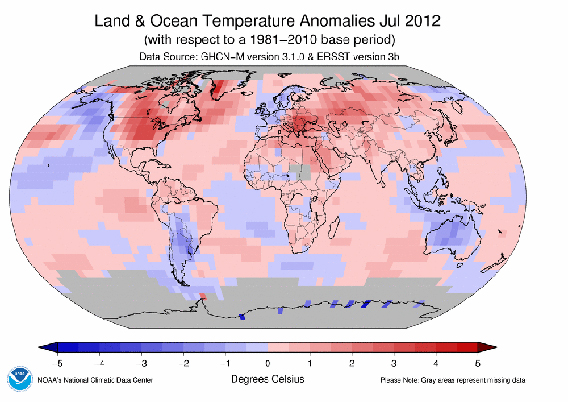
July 2012 temperatures as compared to 1981-2010 baseline. Graph courtesy of NOAA. Click to enlarge.
Last month was the fourth warmest July in the record books going back to 1880 worldwide, according to new data released by the National Oceanic and Atmospheric Administration (NOAA). It was notably warmer in the Northern Hemisphere than in the South: the month was the warmest July ever in the North. Worldwide temperatures were 0.62 degrees Celsius (1.12 degrees Fahrenheit) above the 20th Century average.
“This is the fourth month in a row that the Northern Hemisphere has set a new monthly land temperature record,” the NOAA State of the Climate notes in their analysis.
With the new data in, the year is currently the tenth warmest to date. 2012 began with La Nina conditions subsiding and neutral conditions returning. El Nino has not started yet, however scientists believe there is an over 70 percent chance El Nino conditions will begin by September which would likely raise the global thermostat even further.
July 2012 was the 329th month in a row with global temperatures above the Twentieth Century average. In fact, anyone alive today who is 26 years old or under has never known a month below the global Twentieth Century average.
Climate change linked to greenhouse gas emissions has pushed the global temperature up by 0.8 degrees Celsius (1.44 degrees Fahrenheit) since the early Twentieth Century. Despite decades of international agreements and negotiations, greenhouse gas emissions continue to rise globally as do temperatures.
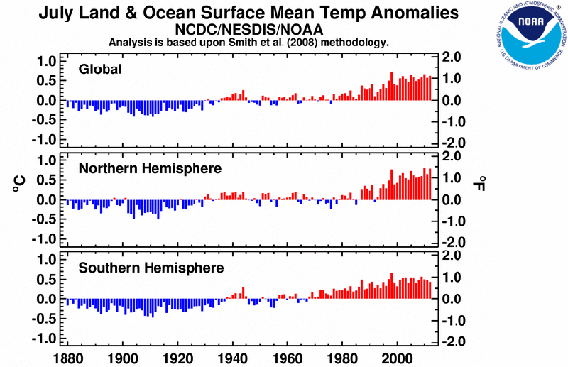
Graph courtesy of NOAA. Click to enlarge.
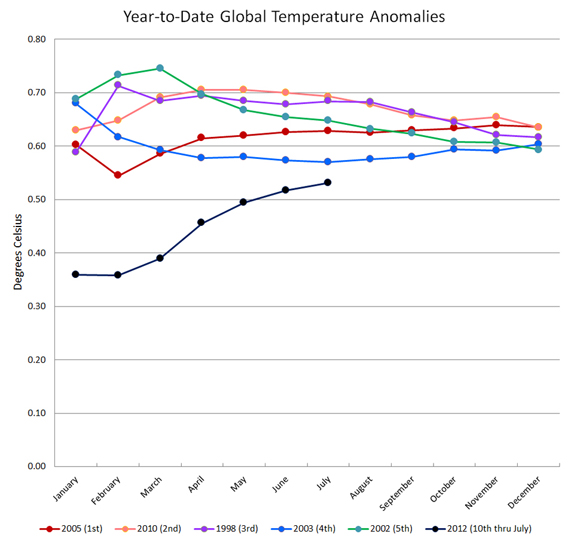
As La Nina subsided, global temperatures have been creeping upward this year (black line). Currently the year is the tenth warmest on record. Graph courtesy of NOAA. Click to enlarge.
Related articles
Greenland suffers record melt
(08/16/2012) Four weeks before Greenland’s melting season usually ends, it has already blown past all previous records. By August 8th, nearly a month before cooler weather usually sets in around the world’s largest island, the island toppled the past record set in 2010.
July 2012: hottest month in U.S. history
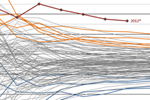
(08/08/2012) Last month was not only the hottest July in U.S. weather history, but the hottest month ever recorded in the contiguous U.S, besting a record struck in July 1936 during the Dust Bowl, according to new data from the National Oceanic and Atmospheric Administration (NOAA). The average temperature last month over the contiguous U.S. was 77.6 degrees Fahrenheit, or 3.3 degrees Fahrenheit above the 20th Century average. Making matters worse, crippling drought continued to spread over 63 percent of the lower 48 states.
Climate and culture: abrupt change and rapid response

(08/06/2012) As the world experiences record heat, increased drought and fires, unprecedented ice melt and similar extreme weather anomalies decades before expected, climatologists have been forced to reconsider previous climate change projections and research techniques. Less than a decade ago, scientific consensus considered warming of more than 2 C and atmospheric levels of carbon dioxide near 450 parts per million (ppm) as acceptable or “safe”. Revised climate science literature and expert opinion now regard safe atmospheric levels of carbon dioxide as below 350 ppm, or less than 1 C rise in average planetary temperature. Many researchers and environmentalists, however, recognize that the present deviation from pre-industrial temperatures of 0.8 C may be unacceptable to prevent runaway climate change and widespread disasters.
Earth’s ecosystems still soaking up half of human carbon emissions

(08/06/2012) Even as humans emit ever more carbon dioxide into the atmosphere, Earth’s ecosystems are still sequestering about half, according to new research in Nature. The study finds that the planet’s oceans, forests, and other vegetation have stepped into overdrive to deal with the influx of carbon emitted from burning fossil fuels, but notes that this doesn’t come without a price, including the acidification of the oceans.
Extreme heatwaves 50 to 100 times more likely due to climate change
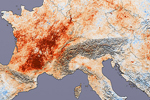
(08/05/2012) A recent rise in deadly, debilitating, and expensive heatwaves was caused by climate change, argues a new statistical analysis published in the Proceedings of the National Academy of Sciences (PNAS). Climatologists found that extreme heatwaves have increased by at least 50 times during the last 30 years. The researchers, including James Hansen of NASA, conclude that climate change is the only explanation for such a statistical jump.
(08/02/2012) Tropical vegetation grew along the coast of Antarctica 52 million years ago, an indication to dramatic climate shifts linked to elevated carbon dioxide levels in the atmosphere, report scientists in Nature.